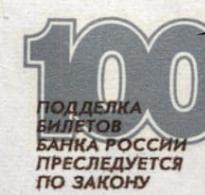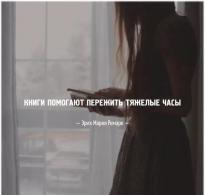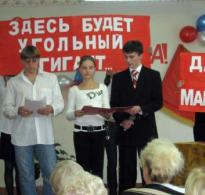Who first said polite people. What kind of person is called polite. Who are "polite people"
The phrase "Polite people" arose during the process of joining Crimea to Russia.
On the night of 26 to 27 February 2014, a few hours after the general brawl between the Crimean Tatars, supporters of Ukraine and Euromaidan and Russians, patriots of Russia, in which there were dead and wounded, well-armed and equipped people in masks seized the buildings of the Supreme Council and the government of Crimea, and a few days later they took them under guard the most important strategic objects of the capital of the Republic and the entire peninsula.
The unknown people had no insignia or nationality, but in private conversations they admitted that they were Russian servicemen. , designating the fighters as Crimean militias. The announcement by the Russian Federation of the actions of its armed forces on the soil of a neighboring, sovereign state would mean recognition of aggression against it, and any territorial acquisitions would mean annexation, which could not be justified by any means.
Russia identified "polite people" as local militias
But why are people "polite"?
- Firstly, they did not interfere in the local social and political life, did not exert any pressure on the will of the Crimeans.
- Secondly, they behaved with restraint and correctness, behaved kindly with others, allowed themselves and themselves to be photographed, even got to know the girls (or allowed the girls to get to know themselves).
- Thirdly, and most importantly, only their presence cooled the ardor of some hotheads who were ready to unleash a civil war on ethnic grounds in Crimea.
How "polite people" took the commandant's office, or "polite people" through the eyes of eyewitnesses
They appeared at the commandant's office of the Simferopol garrison on Saturday, March 15, on the eve of the all-Crimean referendum. Whether this was timed to an upcoming event or some kind of pre-developed plan was put into practice is unknown.
Simferopol is a small city. The streets of its old part are one-story and rather narrow, so the “Polite People” in camouflage, helmets, body armor, with closed faces, machine guns at the ready, their armored personnel carrier, machine gun looked impressive and intimidating with him.
The Ukrainian military locked themselves in the commandant's office. It was both a certain demonstration of disobedience, and a desire to somehow divide the spheres of influence: we, they say, have our own wedding here, you have your own there. The terms of the unspoken agreement were strictly observed, and therefore it was especially amusing to watch how periodically the doors of the commandant's office opened, a Ukrainian soldier with a kettle went out into the street and handed it to his "unknown" colleague: March in Crimea is a windy and capricious month, and life on armor or in she is not very comfortable.
This went on for about a week. But one day, a small rally of Ukrainian military and some civilians gathered at the porch of the commandant's office. "Polite people" () did not interfere in what was happening, on the contrary, modestly took their armored personnel carrier 15 meters to the side. It was their last day of duty. In the morning they disappeared, and the Russian flag flew over the commandant's office.
Almost two years have passed since the mysterious appearance of armed men in green uniforms ensured the peaceful transition of the peninsula to Russia.

But until now, many details of this special operation, brilliant by military standards, have remained secret. We decided to lift the veil of secrecy over some of them.
So who are the "polite people" or "little green men"? The role of "polite people" in the process of joining the Crimea to Russia, Equipment, armament of "polite people".
In short, "polite people" is a euphemism for servicemen of the Armed Forces of the Russian Federation in uniform without insignia who blocked strategic facilities in Crimea during the annexation of the peninsula to Russia, an Internet meme.

HOW MUCH MOSCOW DELIVERED TROOPS TO THE PENINSULA
In accordance with the Kharkov agreement between Russia and Ukraine of 2010, Moscow had the right to have up to 25,000 troops in Crimea. At the time of the Crimean events, there were just over 12.5 thousand of them. Consequently, Russia had every right to bring another 12.5 thousand into the Crimea without violating the Kharkov agreements. At first, this was required to strengthen the Black Sea Fleet, in view of the fact that the nationalists threatened to attack military facilities and even houses where the families of Black Sea Fleet officers lived. And only then did it become necessary to ensure the security of the referendum in Crimea.
The Special Operations Forces, which consist of military intelligence officers, paratroopers, special forces of other military branches, were transferred to the Crimea. These are forces that, by order, at any time can unite under a single command center into a unit of up to 30 thousand bayonets and end up anywhere in the world.

HOW THEY WERE CALLED "POLITE PEOPLE"
Many were surprised at the polite behavior of the Russian military in Crimea. Nowhere else in the world have the military behaved like this. What's the secret?
It turned out that when Putin set a task in the Kremlin for the Minister of Defense and the Chief of the General Staff, he demanded that the actions of Russian troops in Crimea should be extremely polite and even intelligent. These instructions were then brought to each sergeant, not to mention the generals. This was said both before boarding planes and ships, and when landing on Crimean land.
And the very expression "polite people" became popular after the Russian military took control of the Supreme Council of Crimea. On the night of February 27, electricians and plumbers on duty remained in the building of the Supreme Council. When armed men without identification marks entered the building, they announced to the entire duty shift that they could go home and consider this day a day off. One of the plumbers was caught sleeping in the basement. He was terribly frightened by unknown people, and they helped him get dressed, escorted him out, wished him a good day and waved to him. Then a Ukrainian journalist approached this plumber under dozens of foreign television cameras and said: “Ivan Ivanovich, were you beaten? Have you had your fingers stuck in the door?” He scratched his stubble for a long time, not knowing what to answer. Then this journalist asked: “What are these military people like?” He replied: "You know, they are kind of polite." This is where the expression "polite people" comes from.

WAS A WEAPON USED?
The troops in Crimea were given the most severe instructions - not to open fire on the Ukrainian military in any case, except for one thing - when your life is in real (!) mortal danger. Fortunately, during the Crimean operation, the Russian military fired live ammunition only once. It was in Feodosiya, when an operation was carried out to neutralize a Ukrainian marine battalion. There, Ukrainian marines tried to break through to the weapons storage room and resist the Russian troops. There could be a deadly shootout. To avoid this, the Russian military was allowed to fire live ammunition at the door of the weapons storage room. So that Ukrainians can see that the intentions of those blocking their barracks are serious.

WHERE THE "NEW FORM" COME IN THE ARMY - FACE MASKS
"Polite people" were dressed in a new all-season set of basic uniforms, which was designed and sewn in Russia in 2013. This kit is the same for soldiers and officers. It includes 23 items: a suit, several jackets, a vest, a beret, a balaclava, three types of boots (summer, demi-season and winter), gloves ... Eyes were covered with regular ballistic goggles.
In fact, the “little green men” did not try to hide their faces; in many pictures with Crimeans, they were photographed without masks. And the faces of the military were hidden under warm balaclavas for only one reason: during the forced march, an order was given for a single winter field uniform, and the order cannot be violated.

WHY NATO SHAPED CRIMEA
We spoke with many NATO officers, they all answered amicably and in the same way: “We did not expect such decisive impudence from the Russians. We didn't expect them to fool us so cleverly. We turned all our attention to the fact that in those days the Russians were landing a mass landing in the Arctic, military echelons for some reason rushed to the Urals, and Russian units began exercises in the Rostov region. And we thought that it was all done with an eye on Ukraine. Therefore, all intelligence forces were concentrated in these three areas. But we could not think that at the same time large contingents of Russian troops were being airlifted to the Black Sea. And most importantly, all our intelligence services were unable to find at least something suspicious in the telephone conversations between Putin, Shoigu and Chief of the General Staff Gerasimov. An analysis of their telephone conversations did not reveal anything suspicious. It was a great disguise! The Russians outplayed us."
And one more detail. The Russian fighters deployed to the Crimea were ordered not to talk on the phone with relatives and friends about the operation on the peninsula. But no one's cell phones were confiscated. The stake was placed on consciousness and discipline. And she worked. There were no leaks.
And communication between units was maintained not by mobile phones, which are tracked by a signal by NATO intelligence, but by regular radio stations. They are slightly larger than a mobile phone, but the conversation on them is encrypted, and the satellites do not see them.
Journalists sought out those who a year ago were on duty or voluntarily on the peninsula.
“We were greeted with flowers and applause”
Evgeniy Stolyarenko, 23, from Izhevsk, did military service in March 2014:
We arrived in Crimea in March and stayed there until mid-April. First we were sent to Novorossiysk. We did not even guess that after that we would be transported to the peninsula on warships. We guarded the Bastion installations, in Simferopol we guarded the prosecutor's office. In Feodosia, together with special forces, they stormed a battalion of Ukrainian marines - by the way, without a single victim.
When we were still in our units, of course, we watched the news and saw this horror in Ukraine. And when they announced that we were being sent to the Crimea, we did not know what to expect. There were two weeks without communication - Ukrainian mobile operators were still working in Crimea at that time, and we could not buy SIM cards. Imagine how our parents felt!
People in the Crimea were very afraid that the nationalists from Kyiv would move towards them. Therefore, when our troops entered the cities, people greeted us with flowers and applause. Many wept for joy. It was heard: "Russia, forward!" People were really happy because they understood that they were now under the protection of Russia.
“What surprised me was the wretchedness of Ukrainian military units”
36-year-old resident of Kambarka (Udmurtia) Konstantin Fedorov:
I served under contract as a Marine in the Krasnodar Territory. On February 22, we were alerted and transferred to Sevastopol in a few days. And then - in Kerch and set the task - to protect the city port and the Ukrainian military unit, to prevent provocations and looting.
The first thing that surprised me was the wretchedness of Ukrainian military units, uniforms and equipment. It seems that all this remains from Soviet times.
We behaved as politely as possible and did not talk to anyone! And provocations were very common. Young people organized rallies near us, dummy women shouted: “Return our sons!” Or the case in Bakhchisarai, funny, when the Ukrainian command itself closed in part and spread the information that we were not letting them out!
All this time they lived in the open air. The only time we were taken to a military airfield in the village of Kacha, and there we slept on beds for 3 days. It was bliss!
Sevastopol residents were "polite"
21-year-old Ilya Egorov from Torzhok, Tver region. Marine, contractor:
At first we were on a campaign in the Mediterranean, called at the ports of Syria and Cyprus, and in May we arrived in Sevastopol. There I stood in the combat guard of the ship. In the service, they went down to the shore only for exercises: physical training, mountaineering training. And I would call “polite people” first of all the residents of Sevastopol themselves, in communication they are really very polite and pleasant. Everyone sincerely rejoiced at the return to Russia, I personally did not meet Bandera. If they were there, then they all sat at home.
"I've never seen so many happy faces"
48-year-old Novosibirsk Cossack Gennady Volosnikov, volunteer:
At dinner, he told his wife that social networks urged him to go to Crimea. “You are a Cossack - what are you asking? You can do it anyway,” she replied. So, it was allowed... They went to Crimea in civilian clothes, but in hats, because without them, there’s no way.
When asked by Ukrainian border guards about the purpose of the visit, the choir answered: “To the festival of Cossack culture.” One Cossack blurted out: "To visit relatives." So his border guards corrected him: “Wrong - to the festival!”
Patrolled in Evpatoria together with the Berkut. Residents asked where we were from. As they heard that they were from Siberia, for some reason they immediately offered to smoke. Many people called to visit, grandmothers shoved hryvnias: “Boys, buy yourself something tasty!”
MOSCOW, May 16 - RIA Novosti. Friday, May 16, marks two months since the referendum in Crimea, in ensuring the security of which "polite people" - military men without identification marks - took an active part.
During the "straight line" on April 17, Vladimir Putin confirmed that they were representatives of the Russian army. Since that time, the expression "polite people" has firmly entered the political and everyday lexicon of the whole country and, according to experts interviewed by RIA Novosti, is gradually becoming a new symbol of the Russian Armed Forces.
A monument to the "Polite Soldier" will be erected in BakhchisaraiThe purpose of creating the monument is the desire of the city residents to perpetuate the memory of those people who ensured the peaceful and free expression of the will of the townspeople during the all-Crimean referendum, the city council said in a statement."Polite people" with a gun
The beginning of this, as they like to say on the Internet, the meme was laid in late February - early March, when, against the backdrop of the bloody events in Kiev, armed men in camouflage without identification marks began to appear all over Crimea.
They began, as the local press wrote, "politely blocking" local military and transport facilities on the eve of the March 16 referendum, in which more than 96% of voters voted for the peninsula to join Russia.
Answering questions from Russians in April, Putin explained that Russian servicemen stood behind the backs of the Crimean self-defense forces, because "it was simply impossible to hold a referendum openly, honestly, with dignity and help people express their opinions in any other way." He also said that he would award military personnel who took part in ensuring security during the referendum, but he would do so in private.
Later, the Russian leader mocked that the United States had "revealed" the secret of the identities of "polite people": judging by the sanctions list, these are businessmen Gennady Timchenko, Yuri Kovalchuk, Boris and Arkady Rotenberg.
"I think it's just them" polite people "in camouflage, with machine guns. Yes, and their names are somehow strange - Kovalchuk, Rotenberg, Timchenko. Typical Muscovites. I think you need to stay away from them," he replied with a smile Putin to the question whether the sanctions against these entrepreneurs are related to their possible involvement in the events in Crimea.

"The military got the point"
The expression "polite people" in many respects characterizes the new quality of the Russian Armed Forces, which "everyone saw in the Crimea", is a fundamentally new equipment, new weapons, new means of communication, as well as the speed and decisiveness of actions, the editor-in-chief of the National Defense magazine believes. Igor Korotchenko.
In his opinion, to a certain extent, this is the result of Shoigu's activities as Minister of Defense.
The armed forces of Russia, after the collapse of the USSR, found themselves in a state of deep crisis, in recent years have received infusions of many billions of rubles, gradually replacing obsolete both morally and physically weapons with the most modern ones.
"Shoigu set the army and navy in motion - military people got a sense. There is a positive here! The attitude of society towards the army has changed, so it enthusiastically accepted its new face. The army today in Russia is becoming a prestigious social institution, the authority of the RF Armed Forces is being revived," RIA Novosti expert said.
According to him, the new attitude towards the army and its new image are not imposed from above, it is the result of understanding and conscious pride in one's country, because "no image can replace real combat training."
“It was here that all the components were taken into account, as a result of which this new brand “polite people” was born, which characterize the intellectual component and military power of Russia. People wear T-shirts with “polite people” - this is patriotism not imposed from the outside, ”Korotchenko believes .
According to him, the new image of the Russian army has become widespread also because high marks were voiced not only within Russia, but also from the lips of Western experts.
"This is also an indicator - no one expected that the Russian army could demonstrate this new look with such efficiency and clarity. It is very attractive, positive and deserves high praise, including from the current NATO generals," the agency's interlocutor added.

Brand in the service of the military
The Ministry of Defense of the Russian Federation did not stand aside from the general interest in the new meme and tried to put "polite people" at the service of the image of the Russian army. So, the head of the department of culture of the military department, Anton Gubankov, wrote the words for the hymn to "polite people", which was performed during the tour by the Ensemble. Alexandrov in the Crimea and received with a bang.
In addition, the Ministry of Defense decided to start selling branded products with the "Polite People" logo on Victory Day. Special pavilions, where those who wish can purchase T-shirts and other products, will be open on holidays in Moscow, St. Petersburg, Rostov-on-Don, Yekaterinburg and other major Russian cities.
True, it is not clear whether the Ministry of Defense is going to continue this practice further: questions may arise with the right to the brand. As Izvestia wrote, about a month ago, St. Petersburg businessman Roman Yeremyan registered the Polite People brand and is making plans to export clothing.

Russians miss "normal polite guys"
Longing for "politeness" in the Ministry of Defense also explained the popularity of a video that recently appeared on the Internet about the benefits of military service.
The video titled "It's... the first day of your NEW life" was posted to YouTube by mrdmitry187 on May 4th. Since that time, he has gained almost 1.5 million views; only on this video hosting, over 5.5 thousand comments have already been left under the video.
“We are pleasantly surprised by such support for the video by a young audience. Today we can state that “politeness” takes not only cities, but also wins hearts.<…>Our society really misses normal polite guys," a representative of the Ministry of Defense told RIA Novosti.
He confirmed that the military department was involved in the work on the video. "Of course, we know the authors of this original material. These are young, creative and patriotic guys who did everything themselves, from developing the script to its implementation," the source said.
The video is one minute long. "This is the first day of your new life. What happened yesterday does not matter. Who you were before no one cares anymore. Now what matters is who you will be today. Here the pain hardens, the scars are everyday life, it's you trying to prove something, it's you trying to see in every shadow of your enemy, because without an enemy there is no fight, and without a fight there is no victory. surpass, become better than him, and come back - a winner. Because tomorrow is the first day of your new life, "says the voice of the announcer off-screen.
The video ends with the coat of arms of the Ministry of Defense and the inscription "Armed Forces of the Russian Federation".
We often hear the phrases: “be polite”, “respect others”, “keep good manners”, “be well-mannered”. Politeness is a significant difference between a well-mannered person, because it is projected in society in the process of communication. So what does it mean to be polite? What are the main qualities of a polite person?
Basic rules that a polite person must follow
Polite people are endowed with a lot of virtues:
- care not only about themselves, but also about the people around them;
- show courtesy and a sense of tact, compliance and respect, are attentive to the interests and habits of others, even if they differ from their own;
- a polite person must follow the rules of conduct accepted in society;
- there is a sense of self-respect, respect for personal and other people's property;
- sincerity, a polite person should not reproach and express sharp criticism;
- know how to listen and correctly make comments, as well as much more.
In fact, a polite person is one who is in constant development. He is characterized by honesty and sincerity in relationships. In the event of disputes, he is able to keep negative emotions and will never vent his bad mood on outsiders.
Politeness is inherent in all people, since it directly depends on education. Positive qualities in a person develop from childhood, which is the task of parents. Therefore, it is important for the younger generation to see vivid examples of human politeness in everyday life. Everything is important here: intonation, manner of gestures and behavior, friendliness, namely, to greet people you know, and much more. By the way, people are taught to say hello almost from the first weeks of birth. Other qualities of politeness develop as the child grows up.
The meaning of "being a polite person" is now clear to everyone. But this quality has several disadvantages:
- a polite person must show firmness of character in certain situations, otherwise excessive softness can lead to a negative perception of the results of conversations and disputes;
- politeness is manifested in excessive responsibility for other people's obligations, there is a loss of one's own time and moral strength;
- mental self-destruction caused by compassion towards others;
- the negative quality of politeness is the excessive correctness of character and sense of tact, the sacrifice of personal benefits in the name of secondary goals.
Let's be frank and agree with the opinion that education or politeness is more in a person's life than just qualities of character. This is a lifestyle, an example of family relationships, raising children and much more. Therefore, when planning to leave the house next time, one should not forget about moral values and human principles.
What does it mean to be a polite person?
The question of what it means to be polite in any situation remains relevant, regardless of time and circumstances. According to the ancient Greeks, a polite person is able to pacify any disputes and conflicts, prevent aggressive conversations, and must restrain himself. It takes a lot of "trying" to demonstrate your ignorance.
First of all, upbringing is manifested in the way a person greets. It can be a blank nod or good wishes accompanied by a smile. Which option you choose, you expect to receive from strangers. It is interesting that saying hello in accordance with the rules of society has changed with each era. Remember the bows, curtsies, even dances that demonstrate respect and sympathy for the interlocutor. Today, the rules of greeting have been reduced to a minimum: tact, punctuality, helpfulness and modesty. To be an educated person, you should not forget at least about them. Assess your behavior sensibly, draw conclusions and see how polite you are and whether these qualities are important to people?! Stay beautiful and harmoniously developed externally and internally.
Who are these - polite people where did this expression come from, why do the roots come from the Crimea? In this article, we will fully answer questions about this.
Recently, in the world of the Internet, you can increasingly hear the phrase "polite people". The expression has become so common that it has become an internet meme.
This meme gained the greatest popularity after the case when the President of the Russian Federation Vladimir Vladimirovich Putin used it in one of his interviews.
Who are "polite people"?
The term “polite people” was born as a result of the events that took place on the Crimean peninsula at the end of February 2014. At that time, Crimea theoretically belonged to Ukraine, but in fact it was already considered Russian territory.
Then unknown men in military uniform seized two airports in Simferopol and Sevastopol. The people were dressed in unmarked camouflage. They did not give any comments and did not talk to journalists, but they behaved “politely”, they spoke delicately.
Polite people are soldiers with a machine gun in their hands in uniform without symbols or other insignia, who have seized important objects in the Crimea. later it was found out and officially confirmed that they were Russian military personnel.
The history of the meme "polite people"
The first time "polite people" used popular blogger Boris Rozhin in one of his posts describing the turbulent situation in Crimea. He called " polite people seized two airfields in Crimea". Boris heard an interview with the security chief of one of the captured facilities, where he, describing what happened, said: "We were politely asked to leave." The blogger thought it was funny that the armed people who had committed the seizure asked the guards to politely leave the premises. So he decided to use the phrase in the title of his blog. Since then, it has come into general use.
.jpg)
As the author himself says, he came up with only a funny phrase and focused on it. There is no more merit in such a wide distribution of this expression. He does not claim ownership of it and considers "polite people", like many other memes, to be the common property of the Internet community. It was people who spread the meme and made it so popular.
Symbols and identification marks
As mentioned earlier, the soldiers of the Russian army who seized the airfields did not have any identification marks on their camouflage. Therefore, initially there was no symbolism characterizing them.
Subsequently, this was quickly corrected by inventing a visual picture for the catchphrase.
.jpg)
As a result, the image of a fighter with a machine gun in his hands and a hidden face under a mask, glasses and a helmet became a symbol of "polite people". With such an image, various demotivators, photo-toads began to appear on the Internet.
Why did "polite people" become popular?
"Polite people" became very popular among bloggers and social media users very quickly. The term "polite people" is actively used by the media. The Russian army has created an account in Twitter with the same name. What is the reason for such a strong popularity of the meme?
.jpg)
One of the reasons is the surge of national pride in the country, which was especially pronounced after the annexation of Crimea to the territory of Russia. Russians developed pride in their country, the spirit of patriotism woke up. Therefore, this phrase is so fond of Russian Internet users.
Another reason - "polite people" became the first meme of federal significance. Everyone uses it: ordinary users, journalists and politicians, including the president of the country. As practice shows, a unique phrase seen in the words of famous figures is gaining incredible popularity. An example is the “internets” meme, which appeared after George W. Bush said it while answering questions from the audience.
.jpg)
Products with symbols of polite people
People actively use the meme in their communication. Although many of them, most likely, do not even know the expression "polite people."
The popularity of the meme has reached a large scale distribution. Various souvenir products appeared with the image of the symbol of "polite people".
In online stores, if desired, you can buy T-shirts, baseball caps, hats, mugs and other goods with a picture of a soldier with a covered face and a machine gun in his hands.





